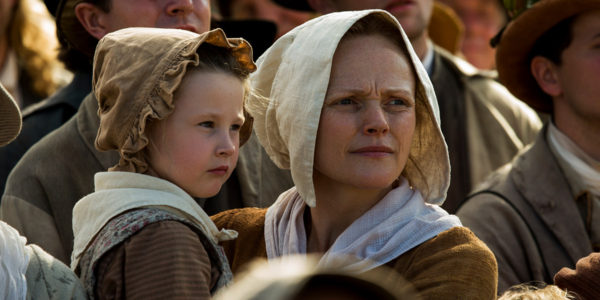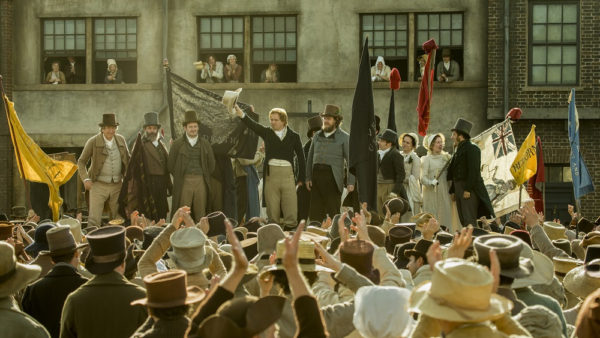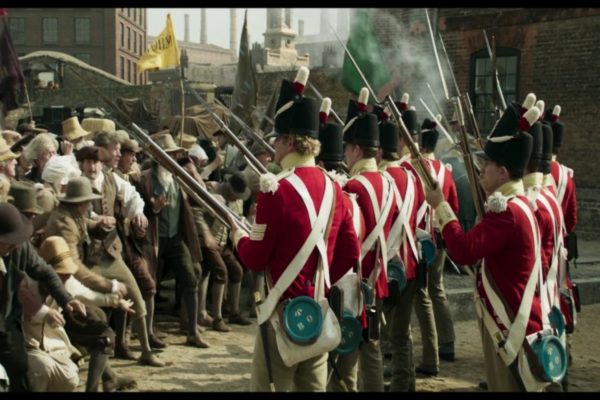Two hundred years ago, a crowd of men, women and children assembled at St. Peter’s Field in Manchester, a major British industrial city, to demand political and economic reforms. The ruling elite, falsely but conveniently equating their demands with sedition and insurrection, ordered troops to break up the peaceful gathering. More than a dozen protesters were killed and hundreds were wounded.

It was a defining moment in the march toward real democracy in Britain, an agonizing process that Mike Leigh deftly explores in his absorbing historical drama, Peterloo, which opens in Canada on May 17.
The incident in question took place in August 1819, almost four years after Britain and its ally, Prussia, defeated France in the epic Battle of Waterloo, which marked the end of the protracted Napoleonic wars. It was a crowning military achievement for Britain, but on the home front, rebellion was in the air. Unemployment had reached new heights. The Corn Laws had driven up the price of grain, much to the detriment of the laboring masses. Universal suffrage in Manchester was still a utopian ideal.
Amid the palpable discontent, British Prime Minister Lord Liverpool urged Parliament to show its gratitude to the Duke of Wellington, the commander of British forces who had vanquished Napoleon’s army. Complying with the prime minister’s request, they voted to reward the duke with the princely gift of 750,000 pounds, a sum that ordinary folk could not even imagine.
Fed up with the inequities of the corrupt old order, which largely benefited the aristocracy and the landowning class, reformers demanded change under the innocuous motto of “Liberty, peace and reform.”
Leigh juxtaposes Parliament’s generosity toward the duke with the fate that befell Joseph (David Moorst), a lowly soldier in the duke’s army. A bugler who survived the carnage on the battlefield, he returned to his parent’s home physically unscathed but mentally scarred. Unable to find employment in Manchester, a gritty centre of the textile industry, he drifted into the ranks of the rebels.
By then, radical reformers such as Henry Hunt (Rory Kinnear) were calling for meaningful constitutional changes to improve the lot of the common man. As one of Hunt’s associates said, “What good is a Parliament if it does not represent its people?”
The privileged few who manipulated the levers of power dismissed the reformers as “ignorant souls,” “dangerous men,” and “disaffected demagogues.” They feared that “ill-educated, ungodly mobs” would plunge Britain into revolution and chaos.
Leigh portrays the opponents of constructive change as mean-spirited, self-centered reactionaries who care only about their own selfish interests and regard everyone else as expendable.
Intent on achieving their democratic goals, the reformers press forward with a plan to stage a rally at St. Peter’s Field in the heart of Manchester, which employs many of the men who support the reformers’ agenda. “Liberty or death,” they shout.

Some of the protesters believe they should arms themselves in case the authorities use repressive tactics against them, but Hunt rejects that approach. “No weapons, no violence,” he declares, alienating at least one of his chief allies.
Sixty thousand people converge on St. Peter’s Field for the occasion. As Hunt launches into his speech, the cavalry is sent in and soldiers brandishing rifles move menacingly toward the massive crowd. These scenes are well-staged and graphic.

In Peterloo, a film distinguished by fine performances from an excellent cast, Leigh reminds us that an egalitarian society does not just appear out of thin air, but is often the product of suppressed grievances, endless struggle and bloody sacrifice.